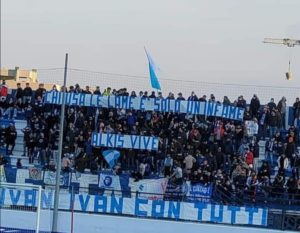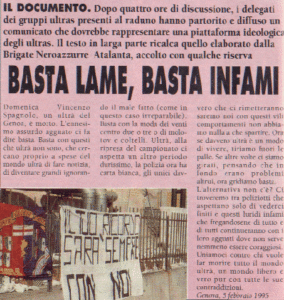
In Italy, the cradle of the ultra subculture, in the 90s, various groups tried in vain to impose new standards by banning weapons and certain practices. The slogan “Basta lame, basta infami” has never been unanimous.
Awareness is, unfortunately, often preceded by tragedy. On January 29, 1995 in Genoa, Genoa hosted AC Milan at Marassi stadium. Members of “Brigate Rossonere II” and “Gruppo Barbour” came to Genoa armed, with the intention of spectacularly fighting the local ultras. Arriving near the stadium, on the North stand side, the Milanese group launched an attack during which Vincenzo Claudio Spagnolo, a 25-year-old Genoa supporter, died from a stab wound.
From Spagna to Alkis
We cannot help but see similarities between the death of Vincenzo Spagnolo, known as “Spagna”, and that of Alkis Kambanos, in Thessaloniki on February 1, 2022. At least by the reaction provoked among the groups of supporters. Moreover, the slogans of the banners in tribute to Alkis displayed by the supporters in Italy – like those of the ultras of Lecce or Fasano – recall the slogans released after the death of Spagna. If the Greek and Italian contexts are different – and the modes of support that have developed there, too – the calls for change that are being heard in Greece echo what happened in the world of Italian ultras after the tragedy in Genoa in 1995. The strong emotion aroused at the time by the death of Spagna had led several major groups to take initiatives so that this type of tragedy would never again bring mourning to the ultras.

Six days later, the delegates of several groups (38 teams are represented) met in Genoa, in assembly, to find solutions and agree on new rules rejecting the cowardly use of bladed weapons during clashes. Among the driving forces behind the movement were the ultras of Bergamo, Parma and the two Genoa clubs. After several hours of discussion, a joint declaration with the value of a pact was issued, entitled “Basta lame, basta infami” (which translates as “No more knives, no more infamies”). The step taken was huge. Some rivalries were overcome. The groups in question decided to take responsibility. “If at other times we turned away, thinking that it was ultimately someone else’s problem, now we shout loud enough” they announced, not without a touch of self-criticism. Almost three decades later, this text is strikingly relevant. In the words of Davide Ravan, “there is no need to add anything […], the “Basta lame basta infami” should be the guideline that all Italian ultras should follow, but even today it is not the case. » The historical balance found in Genoa on February 5, 1995 has indeed proven fragile.

On Sunday, Vincenzo Spagnolo, an ultra of Genoa died. This umpteenth absurd ambush makes us say that enough is enough. Enough of these people, who are not ultras, who try, at the expense of the world of ultras, to make headlines, to become great, ignoring the harm done (in this case, irreparable). Enough of this fashion of 20 against 2 or 3, or even Molotov cocktails and knives. Ultrà, when the championship resumes another very hard period awaits us, the police now have carte blanche, and the only real losers will be us, who have nothing to do with this ignoble behaviour. Now, if being ultras is really a way of life, let us show our courage. If at other times we turned away, thinking that it was ultimately other people's problems, now we are shouting loudly enough. Is there no alternative? We will find ourselves between the police who are only waiting for our end and those dirty people who, caring about nothing and no one, will continue their ambushes where it is not even necessary to be brave. Let us unite against those who want to kill the entire ultra world, a free and true world despite all its contradictions.
Deaths by stabbing are, however, rare. Of all the “tifosi” who died in the pursuit of their passion, there are two: Marco Fonghessi in 1984 and Vincenzo Spagnolo in 1995. Even if there are only two, it will still be two too many. It is also true that the slogan is a bit reductive. As the Rebel Fans of Cosenza pointed out at the time, “around a stadium, you can die in several ways: from a kick to the back of the head like Nazzareno Filippini of Ascoli, or under the baton of a policeman like Furlan of Trieste, from a pistol shot from a carabinieri as happened to Pasquale Ammirati and finally you can die of a heart attack during a police charge (like Celestino Colombini of Bergamo) or suffer the fate of the Romanista Antonio de Falchi, whose heart stopped beating after an attack. The declaration will also be immediately criticized by the Napoli Commando Ultrà Curva B, which dissociates itself from the approach. The groups behind the Genoa meeting are accused of a certain hypocrisy on the question of violence. Even if the ultras are not limited to that, clashes are part of their culture and their range of interventions. The desire to regulate them or subject them to a sort of code of conduct is far from having the favour of all the people in the stands, especially the generation of “Cani Sciolti”.
During the 2003/04 season, the Roma ultras will regularly display the mocking acronym B.I.S.L., for “Basta infami, solo lame” (“No more infamy, only knives”). B.I.S.L. is not defined as just another group, but as “a line of thinking that can be adopted by anyone who disagrees with those who want to change rules as old as the world.” In his book Ultras, the other protagonists of football, Sébastien Louis also cites a banner put out by the Inter ultras in 2006 for the visit of Atalanta, a club from Bergamo whose ultras are known for their rejection of weapons: “If you want to fight with fists, go to a boxing gym, in clashes, the only rule is… no rules!”
For the historian of the ultra movement, “if we want to draw up a balance sheet of this assembly, it is mixed. Indeed, for the first time, the Italian ultras met to discuss together the problem of the deterioration of violence, but this was more limited to an inventory than to a real desire to change things. Moreover, the gratuitous aggressions do not stop after this meeting; the groups continue to lose their influence. The use of all kinds of weapons continues, and hypocrisy is the order of the day.”
Traduction de notre article par Athens Club Κερκίδες Αντίστασης και Αλληλεγγύης

Leave a Reply